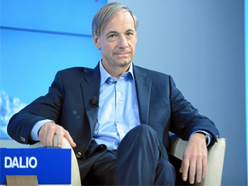
Attention was drawn, on the fourth day of the 43rd World Economic Forum (WEF) in Davos, Switzerland, to the risk of a liquidity bubble as the global economy gains momentum.
Speaking at the annual meet, Ray Dalio, founder and chief investment officer of Bridgewater Associates, warned against such a consequence.
Quoted in a WEF news release, he said, “When spending picks up, it will be incumbent on the central banks to mop excessive liquidity up.”
Read: WEF: Bankers launch charge against tighter regulations
Dalio described the new norm as being a depressed economy, saying the discussion will shift from liquidity to productivity.
“Productivity will be the driver,” he said. “The debt cycle will no longer be the driver; 2013 will be a transition year and the shift of cash will be a game changer.”
Dalio was speaking on a panel which included Anshu Jain, co-chairman of the management board and the group executive committee, Deutsche Bank; Jin Liqun, chairman of the board of supervisors, China Investment Corporation (CIC); Pierre Moscovici, minister of economy and finance of France; Brian T. Moynihan, chief executive officer, Bank of America; and Ignazio Visco, governor of the Bank of Italy.
Read: WEF founder Schwab fears economic collapse
Visco echoed Dalio’s comments, warning against complacency and saying the challenge for central banks will be the absorption of excess liquidity when economic conditions improve.
“Liquidity was needed because of the risks which precipitated from the financial crisis,” he said. “This has been addressed with conventional monetary policy.”
Moynihan also signalled optimism for 2013, but with a sombre tone.
“Investors are waiting for certainty,” he said, confirming the views of Jain who said investors were most specifically looking for policy certainty and regulatory certainty.
“The major thing a central bank produces is not money; it is trust,” said Visco.